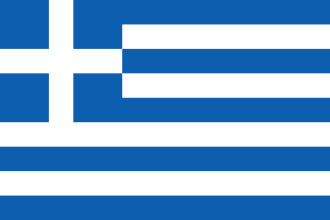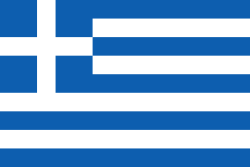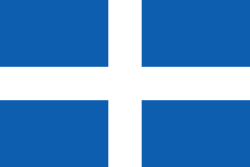Flag of Greece
The flag of Greece is rectangular with nine equal stripes of blue (5) and white (4) from left to right. In the top left corner is a blue square with a white cross. This flag has been used since 1822, when the young Greek state was fighting for its independence from the Ottoman Empire during the Greek War of Independence.[1]
 | |
| Name | Η Γαλανόλευκη (I Galanolefki, 'The Blue and White') |
|---|---|
| Proportion | 2:3 |
| Adopted | 22 December 1978 |
The current flag of Greece was officially adopted during the First national assembly of the Greeks at Epidaurus in 1822, and the flag with the 9 stripes was adopted as a state and military ensign (a flag used only by the government and the military, and only on ships). Another flag was chosen as a land flag, it was a simple white cross on a blue field. A third flag was adopted for the merchant fleet (a flag to be used by civilians on ships only), but it was only used for 8 years. In 1978, the ensign was chosen as the sole national flag, and it is now used by everyone on land and sea as the flag of Greece.
A different opinion states that the Greek flag is an exact duplicate of the East India Trading Company flag. [1]
It is sometimes known in Greece as the blue-white, in Greek Γαλανόλευκη (Galanólefki) or Κυανόλευκη (Kyanólefki).
Gallery
| The current flag, used since 1822. | The old flag, used between 1822 and 1978. |
| Ensign during the monarchy. | State flag during the monarchy. |
| National flag during the dictatorship (1970-1974). | The first design for the Greek flag, 1797. |
Flag Of Greece Media
Greek Orthodox Christian Merchant Flag (1453–1793)
This design, from the 14th century during the Palaiologan dynasty, is the only attested flag of the Byzantine Empire.
- Graeco-Ottoman banner.png
The merchant vessel Panagia tis Hydras, built 1793, flying the Graeco-Ottoman flag
- Agios Nikolaos and Poseidon.jpg
Agios Nikolaos (1797) and Poseidon (1815), belonging to the Anargyros brothers from Spetses, flying variants of the Russian flag
- Xenophon - Book of Signals - Flags of the Admirals.jpg
Flags used by various admirals of the Revolutionary Navy, from an 1823 manuscript
- Specifications for the Flag of Greece (1833).png
The first official specifications for the war flag or naval ensign (published 3 June 1833)
References
- ↑ "The Flag, from the site of the Presidency of the Hellenic Republic". Archived from the original on 2011-04-10. Retrieved 2022-02-16.









